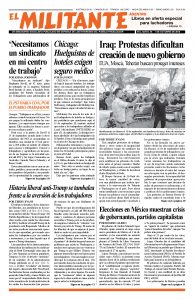Pennsylvania prison officials and liberal Democratic Gov. Tom Wolf announced new rules and regulations Sept. 5 that severely restrict prisoners’ access to books, magazines, newspapers, photos and letters.
The Department of Corrections imposed the rules — and a 12-day lockdown — after claiming that dozens of prison staff and some inmates had been sickened over the last few weeks by touching so-called synthetic marijuana sprayed on letters and books sent to prisoners.
“They’ve wanted to implement more control over the content and incarcerated people’s access to books for a long time,” Jodi Lincoln, co-chair of Book ’Em, told the Militant by phone Sept. 15. Pittsburgh-based Book ’Em and Philadelphia-based Books Through Bars send thousands of used books free of charge to Pennsylvania prisoners every year. “They’re just using the drugs as a scapegoat.”
The new rules were announced in the midst of the lockdown of nearly 47,000 prisoners from Aug. 29 to Sept. 10. During this time no visitors were allowed into the state’s 25 prisons, mail service and book delivery was halted, and inmates were confined to their cells.
“This is a stack of books that are on hold to send to Pennsylvania prisoners,” Tom Haney, who has volunteered with Books Through Bars for six years, told Socialist Workers Party member Janet Post when she went to their office from Philadelphia to express solidarity. “Next to that is another stack just sent back this month from the prisons.”
Haney said they are fighting to reverse the new policy.
Starting immediately, all personal letters to Pennsylvania state prisoners must be sent to Smart Communications in St. Petersburg, Florida. The company, which was awarded a $4 million annual contract, will scan all the mail, including greeting cards, family photos and news clippings, and send them to prisons digitally. Each prison will then review the mail, and, if they deem it appropriate, print them out and deliver it to prisoners. The digital copies will be kept on file by Smart for seven years. Authorities don’t say what those records will be used for.
Correspondence with lawyers will still go directly to each prison, but will be opened by guards in the presence of the inmate, copied and a photocopy given to them. This means prison guards will see every confidential letter between inmates and their lawyers.
Workers behind bars will no longer be able to order books directly from publishers, only through the Department of Corrections. And they won’t be able to request free books from organizations like Books Through Bars and Book ’Em that have been sending books without problems for years.
Prisoners will have to go to a kiosk in the prison to request a book. Then prison officials will decide whether or not to approve the request. They have no time limit for making a decision. If the answer is yes, they’ll inform the prisoner and report the price. The inmate has two business days to pay for the book in full.
Prison officials say they offer an alternative: Buy e-books, which exist only for a small percentage of titles, to read on a special tablet that costs $147 plus tax. Pennsylvania inmates who work earn between 19 and 42 cents an hour.
The same procedure applies to newspapers but with a twist. Papers will still be given to prisoner subscribers until their subscription expires. After that prison officials say that they will buy approved subscriptions in bulk and then distribute issues to those who have paid for them.
Constitutional rights threatened
The Militant has more than two dozen subscribers in Pennsylvania prisons, whose constitutional rights are being threatened by the new rules.
Prisoners can also ask prison libraries to purchase books and subscriptions. “The Department of Corrections says they are going to expand the libraries,” Book ’Em’s Lincoln said. “But the libraries are in abysmal shape and they have no plan to improve them.”
Some doctors scoffed at Pennsylvania officials’ claims that employees were sickened by touching paper soaked in drugs. That’s not how you absorb the drug, they say, but by smoking or eating the drug-infused paper.
“It’s implausible,” Dr. Lewis Nelson, chair of emergency medicine at Rutgers New Jersey Medical School, told the Philadelphia Inquirer. “[Synthetic cannabinoids] don’t cause the effects these folks are having, and certainly not by the route that they’re being exposed.”
New York state prisons had set up a test program last year with similar restrictions, saying prisoners could only order books from a handful of approved vendors with a limited selection. They were forced to back down in the face of protests from civil liberties organizations, and other defenders of free speech and the rights of prisoners. The Federal Bureau of Prisons and Maryland prison officials also began and then rescinded similar rules.
Other prison officials across the country are watching closely what happens in Pennsylvania, Lincoln said. “If these restrictions are not challenged, it could have a ripple effect,” she said.
Book ’Em, Books Through Bars and the Amistad Law Project have encouraged supporters of prisoners’ rights to call Pennsylvania Gov. Wolf and demand that he revoke the restrictions.
Send letters to Gov. Tom Wolf, 508 Main Capitol Building, Harrisburg, PA 17120, or fax him at (717) 772-8284. Send emails to Department of Corrections Secretary John Wetzel at ra-crpadocsecretary@pa.gov.


